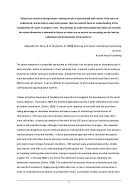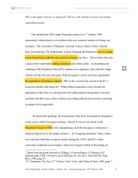Is Pluralism Faithful to the Idea of Democracy?
Is Pluralism Faithful to the Idea of Democracy? This broad question can be asked in a few different ways to help us decipher what its intention is, and also to provide a rough guide to the path to be taken to answer it. Can the existence of pluralism be said to also mean the existence of democracy? Is pluralism the closest we can get to democracy, for the type of societies we live in today (in the West)? Or, is pluralism a diluted form of democracy, in the classical sense, which does not meet the definition of 'rule by the people'? Without turning the investigation into a question of definitions it is necessary, before we embark, to briefly say a few words about the two key concepts in the question: pluralism and democracy. Since the inception of the term, Robert Dahl has been one of the most prominent pluralists. He, and his contemporaries, sought to theorise the 'actual' workings of democracy in a modern society. They documented objectively what is achievable in modern societies as opposed to theories of 'classic', or 'populist', democracy (Dahl, 1956, ch.2). For brevity's sake, we will use the broad definition given by Hague and Harrop: Literally 'rule by the many', pluralism refers to a political system in which numerous competing interest groups exert strong influence over a responsive government. However, each of these groups concentrates on its own area (for
What evidence is there that the state is still the dominant actor in World Politics?
What evidence is there that the state is still the dominant actor in World Politics? For some 300 years from its emergence in the mid seventeenth century the state - in the specific form of the nation state - was rightly regarded as the dominant actor in international economic relationships. (Dicken; 1998, pp 79) One of the most prominent features of the global political system in the second half of the twentieth century is the significant surge in numbers and importance of non state entities. The rise of these transnationally organised non state actors (NSA) and their growing involvement in world politics challenge the assumptions of traditional approaches to international relations which assume that states are the only important units of the international system. This essay plans to analyse the extent of the states dominance in the sphere of world politics. The analysis of NSA influence and the states gradually decreasing dominance shall be explored with reference to two vastly different schools of thought. The first school of thought to be examined is that of 'realism' where a state-centric approach is adopted. The second school of thought to be considered is that of a complex interdependence system where NSA enjoy an almost equal pegging to that of states in the field of international relations. This essay shall refer to and question amongst other things, the growing
Images of inequality - What evidence is there that older people are socially excluded?
A recent news article by Nicholas Timmins (2008) entitled 'Labour's drive to reduce poverty has stalled, according to study' highlighted the failure of Government policy to reduce poverty and exclusion for the elderly. Statistics show that for the first time ever there will be more pensioners in the UK than under 16's (ONS, 2008), but what are the implications of this for Britain's care system, does this mean more socially excluded pensioners, and is age a cause of social exclusion on its own? This essay will argue that age itself is not a cause of social exclusion, but contributing factors such as poor health, social back ground and poor services will increase the risk of being socially excluded. Although some older people may be excluded, one cannot say all older people are. The essay will also investigate the social position of older people in British society, how they have come to occupy this position and also the varying views of old age. The increase in older people in the future will have important implications for social care. According to Wilson et al (2008, p.616), what has been termed a 'demographic time bomb' will constitute a major problem for the provision of services, with the problem being "how to produce services that respond better to the needs of older people while being affordable at the same time." The balance between those of working age and the
Youth Work Essay - we shall look at the history and development of youth work
Youth Work Essay Patricia Farrell December 2012 “The concept of youth work has evolved both nationally and internationally. It has grown from the historical notion of young people coming together in association for the purpose of social activity, to the current notion of young people being prepared to have the necessary skills to act towards an objective of social transformation.” With regard to the above statement, we shall look at the history and development of youth work in order to determine the accuracy of the statement. As a guide to my personal conclusion on the matter, I shall also discuss some key theoretical studies of youth work. These include the personal development model and the Social Education Model, selected for their relevance in Irish policy progression, as we shall look at later. First it is important to clarify what is meant by the term ‘youth work’, and to whom it is applicable. The concept of youth work is one which has developed and evolved significantly over the past century. An ever industrialising society brought about the first forms of youth work, in a casual sense, focusing on young people’s social lives. However, since then, it has earned a more significant and formal role in our society. As a result, youth work has been structured through legislation, and more clearly defined. Ireland saw the introduction of the Youth Work Act
Inter-professional Practice and Safeguarding Children
20042188 CYCC52 Inter-professional Practice and Safeguarding Children CYCC52 Inter-professional Practice and Safeguarding Children Different professional groups may each have their own priorities when it comes to safeguarding children. Giving examples of these, discuss whether it is possible for professionals to work together with the interests of the child to the fore. Essay: 60% of module mark, 2500 words, learning outcomes 1 & 3. First and foremost during this essay I will examine what inter-professional practice is and where it has come from. Furthermore I will analyse the different ways in which the agencies that I work alongside work together to help safeguard children and young people. I will discuss the priorities that they may have using examples which I have been involved in within my setting. I will then discuss whether it is possible to work solely child centred when it comes to safeguarding and analyse the difficulties we may come across while attempting this, mainly focussing on budget restraints and how they affect the young people we provide a service for. I will briefly divulge into the tragedies of both Victoria Climbie and ‘Baby P’ discussing why inter-professional practice was not successful. And finally I will discuss ways in which I believe inter professional practice could be improved across the board by introducing reviewing






















